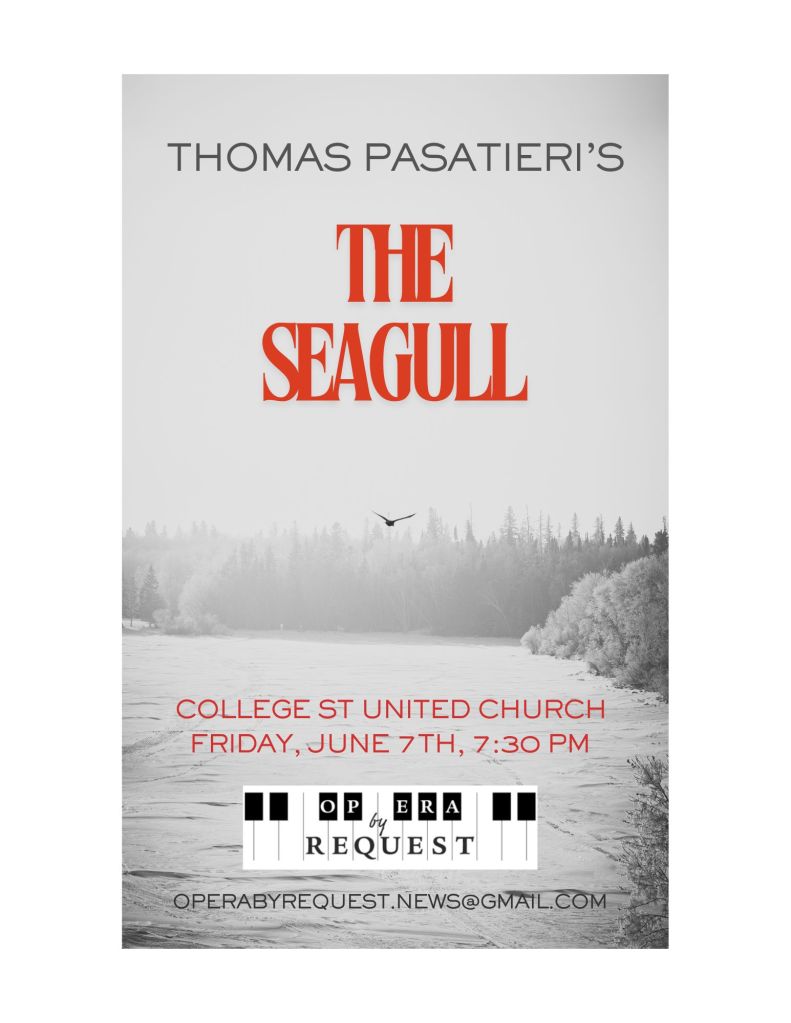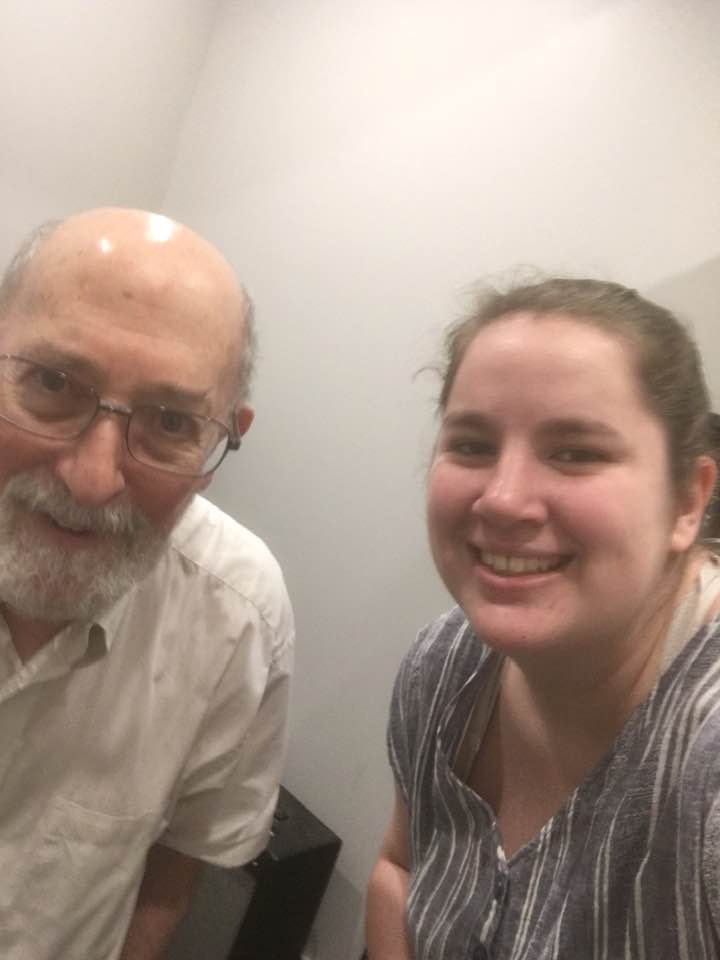Friday night June 7th I witnessed the Canadian premiere of Thomas Pasatieri’s 1974 opera setting Kenward Elmslie’s libretto adapting Anton Chekhov’s 1896 play The Seagull, presented in concert by Opera by Request at the College St United Church.

It can be very poignant, that all the work that went into learning this modern work is for but the one performance June 7th, just as June 6th was for a single showing of Echoes of Bi-Sotoon. Consider by comparison that we learn how to sing or play through touchstones from Carmen or Marriage of Figaro or La boheme, so that the staging is a return to familiar conflicts or lyrical moments presented and sung over and over. I have enormous sympathy and gratitude for the work of Bill Shookhoff, the Music Director and pianist for OBR, learning an intricate piano part that was often subtle as quicksilver and then teaching a series of challenging parts to a large cast: who likely will never sing this again. Repetition– including the learning we do watching and hearing other performers– helps us figure out how to solve the puzzle of an operatic score, how to express the words and music, and to discover how best to portray the drama. With a new work in a single performance, I have to ask: did one really figure out the best ways to do the role? Chances are they would all be that much better in their second or third performance, relaxing into the part, enjoying the feedback from an audience and notes from the director.
I’m tempted to go back to the Chekhov to re-read the play. His greatest works have layers, multiple ways to be understood and interpreted. Pasatieri faced a special challenge in turning the play into an opera, given that whereas the 1896 play affords multiple readings and interpretation, as soon as you set a line or a speech to music with dynamic markings dictating tempo and how loud or soft it’s to be sung, you’re restricting the ambiguities, and more or less dictating the ways it can be interpreted. But when I think back to the two Otello adaptations I’ve seen (Rossini via OBR and Verdi), each in their way distorting the original, I suppose I must cut Pasatieri slack especially given the challenges with a play such as this. Where Shakespeare gives us long speeches inviting arias, Chekhov is more conversational, closer to being realistic, which makes the opera composer’s task even tougher. Pasatieri sometimes makes a very fluid arioso that races along almost as quickly as genuine speech, which is miraculous when one observes the usual problem of opera, that it takes much longer to sing a sentence or a paragraph than it takes to speak it. While I was not always onside, not fully aligned with what the composer was doing (or seemed to be going), Pasatieri has composed a great evening filled with some wonderful music, long lyrical stretches to suck you into the story and the character development. I don’t think I’m being fair in wishing that the music and the singing were quieter and subtler. But there it is. I sometimes find myself trapped in the contradictions manifested in opera, that extroverted medium for show-offs and performers. When you’re Carmen or Escamillo that works especially well, and so Arkadina and Trigorin match that better than a more inwardly directed communicator such as Constantine, whose poetic sensibility is closer to a figure such as Pelleas, so reticent and withdrawn as to defy the usual operatic approaches. He’s in such conflict throughout that his ending (shooting himself offstage) is perhaps inevitable. He will sing beautifully at times, but show misery and despair at other moments.

I am not sure about the way the voices are used, whereby Arkadina is larger than life in every moment, while Trigorin seems much subtler. But then again most composers seem to be better with some characters than with others. Some of this may also be due to the tonal challenge of Chekhov, sitting on a fence between comedy and tragedy, a fence that’s harder to straddle once you set the words to music. I think for example that Pasatieri’s Arkadina (played by Monica Zerbe) pushes a comic sensibility that may frustrate a singer looking for something subtler. I found Andrew Tees as Trigorin much closer to that dividing line, often seeming very light in his delivery and effortless in finding a glamorous persona that’s at times humorous and likeable. Similarly Jenny Ribeiro as Nina is delightful while sometimes riding Pasatieri’s vocal line unavoidably into the more serious, even tragic dimension. She and Constantine (Michael Robert-Broder) get some of Pasatieri’s most poetic moments, lyrical singing going in a more impenetrably symbolist direction, the passages that I found most memorable, even hypnotic as they made time stand still. The symbolist element lurks in the very title of the play / opera, so long as one doesn’t seek to decode, not needing to find meanings.
There is a kind of conflict in Chekhov’s play that I saw presented in the opera, contending approaches to life and to art.
One sees it when Chekhov gives us Medvedenko (Avery Krisman) nattering at Masha (Meagan Reimer) about the challenges of teaching and the expenses of family life, insensible to her dreams although aware that she’s bored with him. There is a pragmatic reality that has comic possibilities almost every moment from Sorin (Steve Henrikson) or the steady observations coming from Pauline (Katie Mills), in opposition to the artists (successful or not) that surround them. We get one version of art from Constantine set in opposition to the pragmatic success of Trigorin the novelist and the impatient language Arkadina the diva-like actress uses to dismiss Constantine’s play, sending a frustrated Nina running from the stage. Pasatieri does an admirable job in setting this up in his arioso, long flowing lines back and forth sometimes interrupted by quirky little passages of impenetrable mystery at the piano (i wonder what they sound like from an orchestra?). I was less happy in the last act when we get more conventionally operatic with a series of longer sequences that one might call arias. Ot maybe that’s how Chekhov wrote it, and I’m not being fair to the composer. But the work is never dull and sometimes very beautiful, which is especially troubling given that this is the first time Toronto got to hear a superb opera that’s deserving of more frequent productions. Indeed this was a concert version with piano, leading me to wonder: what would it look like with costumes, sets, what would they sound like employing an orchestra? Perhaps someday we’ll find out.
Shookhoff did an amazing job at the piano, giving us a detailed account of a difficult score with terrific clarity and wonderful cohesion from a cast who were tuneful, larger than life, never dull. Ah I wish I could see it again.

Opera By Request will be back June 22nd for Cilea’s Adriana Lecouvreur, and September 13th with Dvorak’s Jacobin co-produced with the Canadian Institute for Czech Music.



Pingback: Ariadne on Naxos in 1969 at the Opera School | barczablog